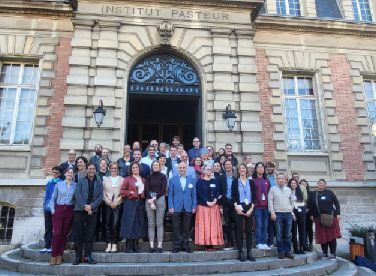New EU-project striving for a paradigm shift in mental health and in developmental diversity: from risk to resilience

The consortium of the EU-funded project Risk and Resilience in Developmental Diversity and Mental Health (R2D2-MH) is kicking-off today in Paris. 26 European and associated partners (Australia, Canada and Israel) will adopt a new approach to improve the well-being of individuals with neurodevelopmental disorders (NDD). They will move away from studying only risk towards and enhanced understanding and promotion of resilience. In doing so, they will consider developmental diversity as well as diagnosis as factors that influence wellbeing and functioning across the entire lifespan.
No effective diagnostics and interventions despite high number of individuals with Mental Health problems
Mental Health problems affect 38,2% of the EU population and cost EU economies €600 billion per year. Neurodevelopmental disorders (NDDs) are conditions affecting growth and development in the brain and typically start early in life. These include conditions such as autism, attention deficit / hyperactivity disorder (ADHD), intellectual disabilities (ID), and speech/language/motor disorders. People with NDDs and their families experience greater discrimination and stigma that has a further negative impact on mental well-being. Currently, there are no highly effective, evidenced based approaches to improve medium to long-term MH outcomes in the context of NDDs. This is due partly to a limited understanding of the neurobiological mechanisms involved in the transition from MH to illness throughout the life course and the interaction with environmental factors. The distinction between diversity and disorder is exactly where R2D2-MH comes in.
Quantifying resilience in addition to risk
Prof. Thomas Bourgeron, Director of the “Human Genetics and Cognitive Functions” Unit at Institut Pasteur in Paris and Project Coordinator:
"The two novelties of R2D2-MH is first the measurement of factors that support resilience in addition to risk. Resilience plays a major role in mental health as it provides a strengths-based focus on how people can adapt in response to adversity and have better outcomes. Traditionally, research focuses on measuring poor outcomes. The novelty of our approach is to identify both risk and resilience factors. Second, we will investigate the influences on mental health outcomes collectively with all stakeholders to redefine wellbeing and functioning at an individual level. I am convinced that R2D2-MH will prepare the ground for personalised approaches of NDD and reduce the stigma.”
The inclusion of associated partners from industry like Roche and advocacy groups like Autism Europe and ADHD Europe ensure the sustainability of our network and the success of the project.
Stéf Bonnot-Briey, states on behalf of Autism Europe: "Autism Europe welcomes R2D2's objective to improving mental health outcomes for autistic people. We are looking forward to working closely with the R2D2 team as fostering a better quality of life for autistic people can only be achieved with their meaningful involvement.”
Beate St Pourcain, Senior Investigator at the Max Planck Institute (MPI) for Psycholinguistics, Nijmegen, the Netherlands says: “We are excited that our research at the Max Planck Institute for Psycholinguistics will contribute to this large international research enterprise. Using genetics to study shared symptoms across population-based and clinical cohorts will broaden our understanding of the dimensional nature of mental health disorders and provide opportunities to identify factors of risk and resilience.”
World-leading collaborative effort at the forefront of research in NDD
R2D2-MH will go beyond the state of the art applying a highly interdisciplinary approach integrating diverse expertise: ethics, epidemiology, sociology, genetics, cell biology, neuroscience, computational modelling, IT development, psychology, and psychiatry. The consortium will study the biological, cognitive, and psychological underpinnings of resilience as positive adaptation in the context of two major early risk factors for MH disorders: carrying a genetic variation associated with NDD and/or being born preterm. R2D2-MH will provide the first multiscale dataset - genetics, gene expression in human brain organoids and brain imaging data - of individuals exposed to similar risk but varying in MH outcome.
Person-centred approach along the whole value chain
R2D2-MH aims to respond to the demand from the NDD community for more recognition of diversity and research into factors that influence well-being and mental health outcomes and to facilitate greater engagement in the management of their health. To this end, the consortium will actively involve citizens in a co-creation process. Members of the community are therefore important contributors to the conduct of the project and its outcomes. This ensures that the opinions of individuals with NDD and their relatives are included to improve their wellbeing and mental health outcomes.
Share this page